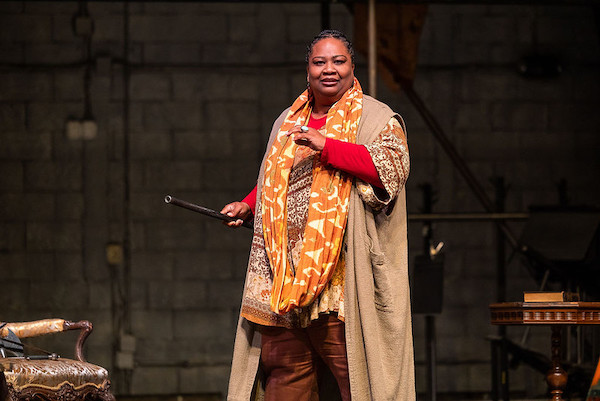Theatre Review: “An Iliad” — A Masterclass in Acting from MaConnia Chesser
By Henry Chandonnet
What elevates An Iliad beyond the routine is MaConnia Chesser’s dazzling performance as The Poet.
An Iliad by Lisa Peterson and Denis O’Hare, based on Robert Fagles’s translation. Directed by Jeffrey Mousseau. Staged by Shakespeare & Company at the Tina Packer Playhouse, 70 Kemble St, Lenox, through July 3.

MaConnia Chesser as The Poet in An Iliad at Shakespeare and Company. Photo: Shakespeare & Company
Over the decades “one-man shows” have become a tiresome by-product of economic necessity, star power, and a fear of drama that is about conflict rather than storytelling. It also reveals the limitations of celebrity: it takes considerable technique to hold an audience’s attention for 90 minutes. All too often the glow of a celebrated name — or the ambition of a lesser known actor — wanes after the 30-minute mark. A dull core of mediocrity is left exposed. So it is a pleasure to report that Shakespeare & Company’s An Iliad turns out to be an exception to the depressing rule: MaConnia Chesser’s performance is revelatory, though to triumph it has to subvert what is a mundane adaptation of Homer’s Iliad.
Written by Lisa Peterson and Denis O’Hare, An Iliad sets out to make Homer’s epic poem palatable to contemporary audiences. That’s not to say that the story is grounded in 21st-century culture; no, the narrative is still distinctly ancient Greek. What’s been simplified is Homer’s language and the plot, which has been abridged for quick consumption. We are told the iconic story by a figure called The Poet, who speaks directly (and very seriously) to the audience via a version of adult storytime. The violence of the epic is not mitigated; outsized portions of the show ask an audience to envision the buckets of blood, the martial mayhem, the lives lost. In that sense, An Iliad departs from Homer’s complex view of combat; it is a straightforward antiwar play, a stance that takes on particular resonance given the raging horrors in Ukraine. The Poet asks us to consider the physical toll of war, and the psychological conditioning needed to transform an everyday individual into a killing machine. This is not a new or challenging approach to a tried-and-true-theme.
What elevates An Iliad beyond the routine is MaConnia Chesser’s performance as The Poet. She is dazzling as she skillfully maneuvers through a number of emotional tones. Initially, Chesser welcomes us with light quips and an inviting demeanor. Soon names like Agamemnon and Patroclus are no longer intimidating or smack of dull college lectures. Once Chesser comfortably immerses us in the narrative, she subjects that connection to a powerful series of shocks and stresses. Throughout the evening there are moments when The Poet seems to have become mentally imbalanced; it is as if she has absorbed the epic’s sociopathic furies. The figure is filled with rage, and that anger is personal. Chesser handles The Poet’s urge toward self-destruction with fluidity and grace: the breakdown, when it finally comes, feels natural. And, because Chesser is a Black woman, we learn new things about the text and the relationship it sets up between brutalizer and brutalized. When Andromache learns of her husband Hector’s death, The Poet is asked to take on the woman’s grief. Chesser screams and wails are poignant, not only on a domestic level, but as the enduring pain of the oppressed.
Chesser’s turn is especially impressive given An Iliad‘s uninspired staging and production elements. The messy apartment-style set, the exposed wooden beam — it’s all been seen before. The lighting design provides flickers of intrigue, but all too often it is conventional. (Red lights for war, etc.) Still, it is the didactic writing approach of Peterson and O’Hare that irritates the most. At the end of the play The Poet surrenders to madness and spends (what seems to be) several minutes listing wars from the Homeric period to present. It is a laundry list. Ironically, Chesser’s powerful performance has already made the play’s point about the indestructibility of war crystal clear. Still, despite its earnestness, the recitation is moving because Chesser approaches it aggressively — the roll-call of death is treated as a nauseating manifesto. And that should be a lesson to our theaters as they — forced by current realities and the success of Hamilton — take up politics. Stay away from the brash, the overwrought, the easy finger-pointing, and trust to the skill and humanity of performers to force us to bear witness to what we don’t want to see or hear. Chesser grabs your hand and makes it impossible not to listen.
Henry Chandonnet is a current student at Tufts University double majoring in English and Political Science with a minor in Economics. On-campus, he is an Arts Editor for the Tufts Daily, the preeminent student-run campus publication. You can reach out to him at henrychandonnet@gmail.com, or follow him on Twitter @HenryChandonnet.
Tagged: An Iliad, Denis O’Hare, Jeffrey Mousseau, Lisa Peterson, MaConnia Chesser
